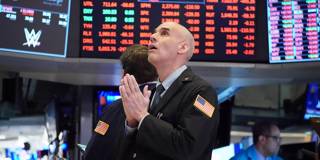There is no telling whether equity markets are correct in defying the popular narrative about a coming Great Depression-scale downturn. Investors may be clinging to irrational hopes, or they may be betting that reports of the death of globalization have been greatly exaggerated.
LONDON – Though I have spent nearly 40 years studying financial markets, I find them as bewildering, complex, and fascinating as ever. At the time of this writing, the most widely watched equity index, the S&P 500, is trading at around 2,878, where it closed on April 27 (a Monday). That was its highest close in six weeks, putting it less than 15% below its all-time high, reached just before the COVID-19 pandemic, and some 30% above its low in March.
This outcome seems to fly in the face of growing evidence suggesting that the US economy is headed for a contraction on a scale unseen since the Great Depression. Why is the US stock market (and many other markets) behaving this way? Are today’s market participants collectively smarter than the financial commentariat, as so often turns out to be the case?
Back in January, the COVID-19 outbreak was widely expected to produce a V-shaped recession (a sharp drop, followed by an equally sharp rebound) for most economies, because that is what happened in the case of SARS and other epidemics since the turn of the century. Four months later, it is certainly reasonable to ask if markets have been lulled into a state of irrational hope, finding comfort in the assumption that policymakers will continue to do “whatever it takes.”

LONDON – Though I have spent nearly 40 years studying financial markets, I find them as bewildering, complex, and fascinating as ever. At the time of this writing, the most widely watched equity index, the S&P 500, is trading at around 2,878, where it closed on April 27 (a Monday). That was its highest close in six weeks, putting it less than 15% below its all-time high, reached just before the COVID-19 pandemic, and some 30% above its low in March.
This outcome seems to fly in the face of growing evidence suggesting that the US economy is headed for a contraction on a scale unseen since the Great Depression. Why is the US stock market (and many other markets) behaving this way? Are today’s market participants collectively smarter than the financial commentariat, as so often turns out to be the case?
Back in January, the COVID-19 outbreak was widely expected to produce a V-shaped recession (a sharp drop, followed by an equally sharp rebound) for most economies, because that is what happened in the case of SARS and other epidemics since the turn of the century. Four months later, it is certainly reasonable to ask if markets have been lulled into a state of irrational hope, finding comfort in the assumption that policymakers will continue to do “whatever it takes.”